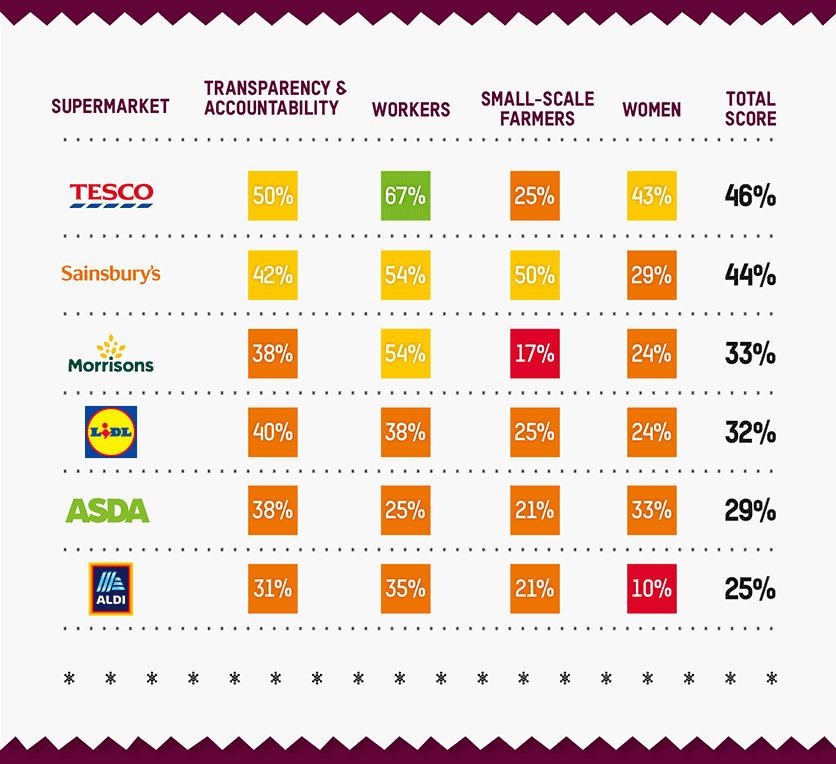
Food and Drink
THE PROBLEM
Most of the world’s production of food is done by small-scale farmers who are often powerless against the enormous power that is wielded by large supermarkets. At one end of the scale there is forced labour. At the other end there is unfair remuneration.
It might also include:
-
Dire working conditions for people picking fruit and vegetables in southern Italy
-
Exposure to dangerous chemicals on pineapple plantations in Costa Rica
-
Poverty wages paid to tea pickers in India
-
Slave-caught seafood in Thailand and Indonesia
It is difficult to track a component of an end product back to a particular producer as there are complex supply chains involved. This makes it incredibly hard to be certain of whether a product has been produced without slavery.
The chances of slavery increase when companies give suppliers large orders with short turnaround times beyond the suppliers' capacity. Sub-contracting becomes more common in this scenario and they may not be regulated by the same standards.
In the UK, the Modern Slavery Act passed in 2015 obliges businesses with an annual turnover of over £36 million to disclose the steps they take to tackle slavery in the supply chain. The TISC - Transparency In The Supply Chain statement should be prominent on their websites. In 2019 only 9.3% of businesses had complied with this requirement.
In the UK, the Farmers Weekly magazine reported in May 2018 the shocking extent of modern slavery in agriculture.
-
Mainly Bulgarian and Romanian men are working 15 hour days in horrific conditions for less than the minimum wage
-
Gang masters are licenced and subject to rules and regulations but often charge workers for finding them work
-
Workers are regularly accommodated in caravan parks with conditions at some sites being described as horrific, unsanitary and overcrowded
-
Criminal gangs are trafficking workers here illegally and under false pretences of the type of work they will be doing
Oxfam: Behind the barcode campaign June 2018 created a scorecard of 16 supermarkets, 6 of which are in the UK.
The scorecard:
-
will re-assess each supermarket annually
-
grades their policies on transparency, workers’ rights, women’s rights and small-scale farmers.
-
provide consumers with a useful tool to help with choices.
-
will also create competition between companies to do better.
Oxfam ranked Aldi as UK’s worst major supermarket for public policies and practices that prevent human suffering.
There is grossly unequal share of the profits across the food supply chain. The share of profits is heavily weighted to the processors, manufacturers and supermarkets. The small scale farmer gets very little of the profit. The increasing power of the supermarkets creates the demand for labour exploitation in supply chains.
WHAT CAN WE DO?
-
Buy local where possible. Look for Direct Trade and Fair Trade – there are now 6000 products to choose from, including flowers!
-
Visit your preferred supermarkets website and look at their Modern Slavery Statement to see what steps they are taking to eradicate modern slavery in their supply chains.
-
Find supermarkets and suppliers who are working hard to get this right. The Ethical Consumer Magazine provides comprehensive and up-to-date information to help you make your choices.
-
Begin to make small changes where you can in your weekly shop and according to your budget.
-
Use your consumer power - use the Oxfam form to email your supermarket directly.
-
Use social media to help persuade supermarkets to do better and to raise awareness amongst your friends.
-
Do not boycott as this often makes things worse in an already poor economy.

